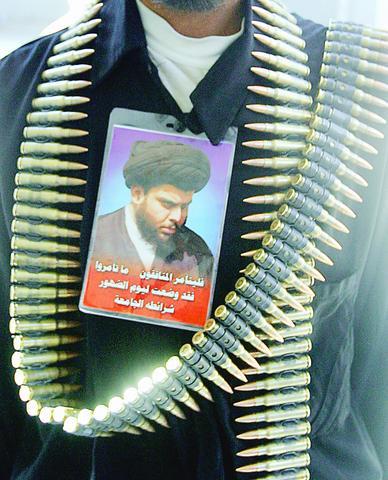Insurgents fired mortars at a meeting where Iraqi leaders met to pick an interim national assembly yesterday, killing at least one in a brazen attack showing the problems the country faces on its path to democracy.
The Interior Ministry said three mortar bombs hit a taxi and bus station on the edge of the heavily fortified Green Zone in Baghdad, a few hundred meters away from the conference center, also wounding 17 people.

PHOTO: REUTERS
The three-day conference, attended by 1,300 delegates, was not affected and sessions proceeded as planned, although many delegates were startled as windows shook.
The attack, despite massive security, curfews around the zone, checkpoints and blocked streets illustrates Iraq's nightmarish security as politicians and religious leaders try to plot the country's stuttering road to democracy.
The Health Ministry said one person was killed and 17 hurt.
Clashes also broke out between police and gunmen in Haifa street in central Baghdad. There was no word of casualties.
The opening of the conference came amid sporadic fighting in the holy city of Najaf between Shiite militiamen and combined US and Iraqi forces after the collapse of peace talks on Saturday.
Five blasts echoed from near Najaf's holy sites after midday, but there were no signs US and Iraqi forces had launched an all-out offensive against the militia loyal to Shiite cleric Moqtada al-Sadr.
The failed peace talks had aimed to end 10 days of fighting that has killed hundreds and threatened to undermine the authority of interim Prime Minister Ayad Allawi.
Police chief Ghaleb al-Jazaeri earlier called a news conference and threatened to arrest local staff of all media outlets if both Iraqi and foreign staff did not leave Najaf.
He did not elaborate.
The political and religious leaders gathered for the conference in Baghdad will choose a 100-member assembly, or national council, to oversee the interim government until elections are held in January.
"Your presence here today is the biggest challenge to the forces of darkness that want to tear this country apart. This is not the end of the road, it is the first step on the way to democracy," Allawi said in opening remarks.
The conference has been beset by boycotts from key players such as Sadr and the Muslim Clerics Association, an influential grouping of Sunni religious leaders. Some Shiite leaders threatened to withdraw from the conference because of the fighting in Najaf.
The conference was due to open late last month but was delayed after the UN demanded more time for preparations. Some delegates taking part have accused the government of stacking the slate with Allawi supporters.
"The political parties in power now have the overwhelming majority of delegates. They left no room for independents," said Mohammed Bahr al-Uloum, a leading Shiite cleric.
Also see story:

NATIONAL SECURITY THREAT: An official said that Guan Guan’s comments had gone beyond the threshold of free speech, as she advocated for the destruction of the ROC China-born media influencer Guan Guan’s (關關) residency permit has been revoked for repeatedly posting pro-China content that threatens national security, the National Immigration Agency said yesterday. Guan Guan has said many controversial things in her videos posted to Douyin (抖音), including “the red flag will soon be painted all over Taiwan” and “Taiwan is an inseparable part of China,” while expressing hope for expedited “reunification.” The agency received multiple reports alleging that Guan Guan had advocated for armed reunification last year. After investigating, the agency last month issued a notice requiring her to appear and account for her actions. Guan Guan appeared as required,

A strong cold air mass is expected to arrive tonight, bringing a change in weather and a drop in temperature, the Central Weather Administration (CWA) said. The coldest time would be early on Thursday morning, with temperatures in some areas dipping as low as 8°C, it said. Daytime highs yesterday were 22°C to 24°C in northern and eastern Taiwan, and about 25°C to 28°C in the central and southern regions, it said. However, nighttime lows would dip to about 15°C to 16°C in central and northern Taiwan as well as the northeast, and 17°C to 19°C elsewhere, it said. Tropical Storm Nokaen, currently

PAPERS, PLEASE: The gang exploited the high value of the passports, selling them at inflated prices to Chinese buyers, who would treat them as ‘invisibility cloaks’ The Yilan District Court has handed four members of a syndicate prison terms ranging from one year and two months to two years and two months for their involvement in a scheme to purchase Taiwanese passports and resell them abroad at a massive markup. A Chinese human smuggling syndicate purchased Taiwanese passports through local criminal networks, exploiting the passports’ visa-free travel privileges to turn a profit of more than 20 times the original price, the court said. Such criminal organizations enable people to impersonate Taiwanese when entering and exiting Taiwan and other countries, undermining social order and the credibility of the nation’s

‘SALAMI-SLICING’: Beijing’s ‘gray zone’ tactics around the Pratas Islands have been slowly intensifying, with the PLA testing Taiwan’s responses and limits, an expert said The Ministry of National Defense yesterday condemned an intrusion by a Chinese drone into the airspace of the Pratas Islands (Dongsha Islands, 東沙群島) as a serious disruption of regional peace. The ministry said it detected the Chinese surveillance and reconnaissance drone entering the southwestern parts of Taiwan’s air defense identification zone early yesterday, and it approached the Pratas Islands at 5:41am. The ministry said it immediately notified the garrison stationed in the area to enhance aerial surveillance and alert levels, and the drone was detected in the islands’ territorial airspace at 5:44am, maintaining an altitude outside the effective range of air-defense weaponry. Following